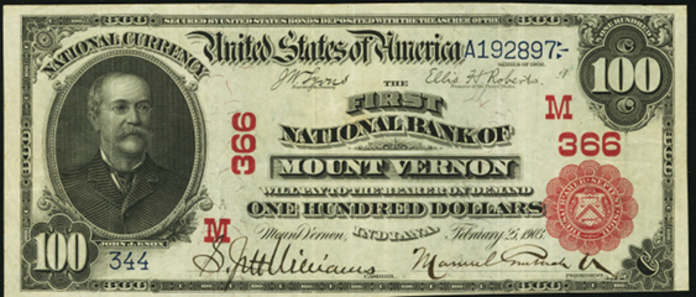One Hundred Dollar Notes › Nationals › 1902 One Hundred Dollar National Bank Notes › Nebraska Charters › 1902 $100 Hastings Nebraska Nebraska National Bank
Get Value Now
| Item | Info |
|---|---|
| Series | 1902 |
| Charter | #3732 Nebraska National Bank of Hastings, Nebraska |
| Year Chartered | 1887, 220 Banks Chartered |
| City Info | Hastings is a city and county seat of Adams County, Nebraska, United States. The population was 24,907 at the 2010 census. It is known as the town where Kool-Aid was invented by Edwin Perkins in 1927, and celebrates that event with the Kool-Aid Days festival every August. Hastings is also known for Fisher Fountain, and during World War II operated the largest Naval Ammunition Depot in the United States. Source: Wikipedia |
| Similar Cities | 13 banks with similar city. First 12 below: 1. Hastings, Minnesota - First National Bank 2. Hastings, Minnesota - Merchants National Bank 3. Hastings, Michigan - Hastings National Bank 4. Hastings, Nebraska - First National Bank 5. Hastings, Nebraska - Exchange National Bank 6. Hastings, Nebraska - City National Bank 7. Hastings, Oklahoma - First National Bank 8. Hastings, Oklahoma - National Bank of Hastings 9. Hastings Upon Hudson, New York - First National Bank 10. Hastings, Oklahoma - National Bank of Hastings 11. Hastings, Minnesota - Hastings National Bank 12. Hastings, Pennsylvania - First National Bank |
| Seal Varieties | Red, Blue |
| Other Info | 1. Value depends on notes known for charter, condition and market demand. |
| Neat Fact | Plate letters A-C for $50 Notes, A for $100 Notes (Friedbergs, 20th Ed. P 99) |
No Obligations Offers and Appraisals
Please submit a good photo or scan. It will be identified and evaluated. Understand there may be subtle differences between the image you see above and your note. Signatures, design, markings and note condition will determine the offer price. Notes in Uncirculated or better condition receive the best offers.
Appraisals can be estimated for wholesale and retail prices. Wholesale is what dealers typically pay. Retail is what a collector might pay. Retail is slightly higher in most cases.
Please visit this page for USA Paper Money Reference. Do not treat this page as a reference guide, it is for appraisal and acquisition purposes only.
